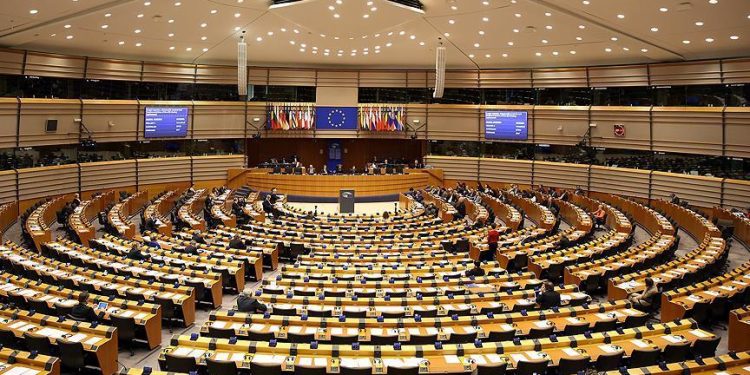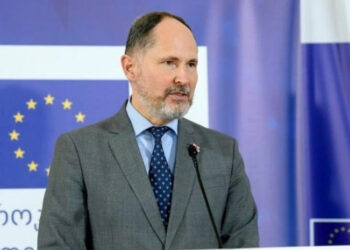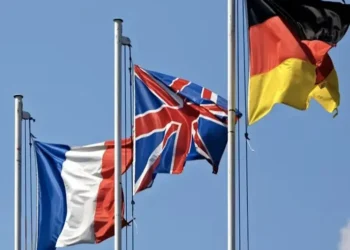Members of the European Parliament voted 504 to 4 with 32 abstentions to adopt a resolution on closer ties between the EU and Armenia and the need for a peace agreement between Azerbaijan and Armenia.
The resolution:
1. Recognises and welcomes the fact that Armenian has strongly emphasised its desire to enhance and prioritise relations with the European Union; believes that the European Union should respond positively and take full advantage of this potential geopolitical shift and help Armenia anchor itself more strongly in the community of democracies;
2. Calls for the sustained implementation of the newly agreed EU-Armenia Partnership Agenda, emphasising the need to actively pursue and achieve the ambitious joint priorities for cooperation; believes that a substantial partnership between the EU and Armenia is a logical step in aligning with Armenia’s choice in favour of democracy, the rule of law, the fight against corruption and respect for the international rules-based order;
3. Welcomes Armenia’s commitment to implementing CEPA and the progress it has made in implementing the CEPA roadmap; welcomes the fact that the Armenian Government recognises CEPA as a strategic blueprint for key reforms in Armenia; encourages the Commission and the Member States to start working on a roadmap to achieve an ambitious upgrade to the EU’s relations with Armenia; believes that the experience stemming from the Association Agreements / Deep and Comprehensive Free Trade Areas with Ukraine, Georgia and the Republic of Moldova should serve as a good basis, in particular in relation to a gradual sectoral integration with the single market, which should bear tangible benefits on a macro and micro scale for Armenia;
4. Reiterates that, pursuant to Article 49 of the Treaty of European Union, any European state may apply to become a member of the European Union provided that it adheres to the Copenhagen criteria and the principles of democracy, respects fundamental freedoms and human and minority rights and upholds the rule of law; considers that, should Armenia be interested in applying for candidate status and continuing on its path of sustained reforms consolidating its democracy, this could set the stage for a transformative phase in EU-Armenia relations; calls on the Commission and the Council to actively support Armenia’s desire for increased cooperation with the EU, not only in the area of economic partnership but also in political dialogue, people-to-people contacts, sectoral integration and security cooperation;
5. Supports Armenia in its continuous efforts to implement reforms and strengthen democracy, the rule of law and good governance; underscores the important role of civil society in the implementation of the reforms; calls on Armenia to continue cooperating with the EU in this regard and calls for the EU to increase support in these areas, in particular technical support and the exchange of expertise; encourages Armenia’s active engagement in the Eastern Partnership policy as a means of fostering good neighbourly relations in the South Caucasus;
6. Recognises that the Russian Federation’s influence on the Armenian economy remains high, encourages Armenia to exert vigilance on possible EU sanctions circumvention taking place in the country; is fully aware of the level and diversity of threats that the Russian Federation might try to use against Armenia to punish it for its independent political and strategic choices; believes that the EU needs to be ready to provide rapid assistance to Armenia to mitigate the negative consequences of any such unfriendly steps;
7. Notes that over the last 10 years, the volume of Armenia-EU bilateral trade has been increasing; encourages Armenia, the EU and its Member States, as well as European companies and investors, to take the necessary steps to further enhance their economic and trade relations; commends the success of the Economic and Investment Plan and encourages the EU and Armenia to continue leveraging both public and private investments to promote sustainable development in Armenia;
8. Recognises the urgent need to strengthen the cooperation between the EU and Armenia in the field of security and defence while Armenia reconsiders its membership of the CSTO; calls for the EU to respond favourably to Armenia’s request for support via the European Peace Facility and to provide support to the Armenian military; notes the added value of regular EU-Armenian Political and Security Dialogues, as an umbrella platform for all security related matters; calls for the launch of a hybrid threat assessment survey, which will help Armenia to identify key vulnerabilities and devise targeted solutions; welcomes the actions undertaken by several Member States to provide defensive military support to Armenia and urges the Member States to consider similar initiatives;
9. Welcomes Armenia’s decision to suspend its participation in the CSTO, following its failure to assist Armenia against military aggression, and to seek a more reliable security architecture; supports Armenia’s official request for the Russian Federation to withdraw its Federal Security Service border guards from its international airport;
10. Recognises the untapped potential of people-to-people contacts between the EU and Armenia; calls for the progress achieved by Armenia in implementing the agreements on visa facilitation and readmission to be acknowledged; believes that it is time to launch a visa liberalisation dialogue with Armenia;
11. Welcomes the conclusion of the agreement between the EU and the Republic of Armenia, which will enable the transfer of operational personal data between Eurojust and Armenia’s competent authorities as part of judicial cooperation in criminal matters; underlines the importance of continuing to deepen the cooperation between the EU and Armenia in fighting crime and terrorism and protecting the security of the Union for mutual benefit;
12. Expresses its support for the activities of EUMA and underscores the important role it plays; calls for its mandate to be extended beyond 2025 and its staffing to be further increased; reiterates its disappointment at Azerbaijan’s refusal to allow the mission to operate on its side of the border and the repeated smear campaigns originating from Azerbaijan against EUMA; deplores the fact that Russian border guards stationed in Armenia blocked EUMA from reaching the village of Nerkin Hand where four Armenian soldiers were recently killed at the hands of Azerbaijan on 13 February 2024, following the alleged injury of an Azerbaijani soldier; condemns the inflammatory rhetoric deployed by Azerbaijani officials against the EU, its Member States, EUMA and the Armenian authorities;
13. Underscores that the EU should be ready to impose sanctions on any individuals and entities that threaten the sovereignty, independence and territorial integrity of Armenia;
14. Calls on Azerbaijan to genuinely engage in a comprehensive and transparent dialogue with the Karabakh Armenians to ensure respect for their rights and guarantee their security, including their right to return to and live in their homes in dignity and safety under international presence, to access their land and property rights, to maintain their distinct identity and fully enjoy their civic, cultural, social and religious rights; calls on Azerbaijan to release and commit to broad amnesty for all the inhabitants of Nagorno Karabakh and Armenia who continue to be in Azerbaijani custody; calls for the full, immediate and effective implementation of all the ICJ orders in the case on the Application of the International Convention on the Elimination of All Forms of Racial Discrimination (Armenia v Azerbaijan);
15. Reiterates its condemnation of the Azerbaijani military incursions into the internationally recognised territory of Armenia and ongoing occupation of parts of it; reiterates its demand for the withdrawal of Azerbaijan’s troops from the entirety of the sovereign territory of Armenia; rejects and expresses its grave concern regarding the irredentist and inflammatory statements made by the Azerbaijani President and other Azerbaijani officials threatening the territorial integrity and sovereignty of Armenia, including those in connection with demanding the exterritorial corridor linking Azerbaijan to its exclave of Nakhchivan; warns Azerbaijan against any potential military adventurism against Armenia proper; highlights that Azerbaijan’s connectivity issues with its exclave of Nakhchivan should be resolved with full respect for the sovereignty and territorial integrity of Armenia;
16. Reiterates the European Union’s unequivocal support for the sovereignty, territorial integrity and inviolability of the borders of Armenia; strongly supports the normalisation of relations between Armenia and Azerbaijan based on the principles of mutual recognition of territorial integrity and inviolability of borders based on the 1991 Almaty Declaration, border delimitation based on relevant USSR General Staff maps that have been provided to both sides, and the unblocking of regional communication based on respect for the sovereignty and jurisdiction of both countries, on the basis of reciprocity and equality;
17. Expresses its support for the resumption of talks between Armenia and Azerbaijan on all pending issues, with the aim of concluding a peace treaty, and calls on both parties to remain fully committed to a lasting and peaceful settlement of the long-standing dispute, through dialogue and negotiations; believes that this agreement needs to be negotiated in good faith and be based on the recognition of sovereignty, territorial integrity and non-use of force; calls for a stronger EU commitment to continue facilitating a comprehensive, sustainable peace for the benefit of all the people of the region; calls on Türkiye and other allies of Azerbaijan to refrain from fuelling bellicose behaviour from Baku and to exert their influence in favour of a swift conclusion to the peace negotiations;
18. Strongly disagrees with the tone of some recent statements by leaders of the Commission and the European Council congratulating President Aliyev for his re-election without mentioning the absence of democracy in Azerbaijan and misleadingly qualifying Azerbaijan as a reliable partner; affirms that these statements do not reflect the position of the European Union and should never have been made in the light of the ethnic cleansing in Nagorno-Karabakh by Azerbaijan; urges the Vice-President of the Commission / High Representative of the Union for Foreign Affairs and Security Policy and the European External Action Service to continue the negotiations for a renewed partnership agreement conditionally, if Azerbaijan has demonstrated its genuine readiness to respect the rights and security concerns of the Karabakh Armenians and has contributed to substantial progress towards a comprehensive and sustainable peace agreement with Armenia;
19. Expresses serious concern about the failure to safeguard the cultural, religious and historical heritage of the Armenian population of Nagorno-Karabakh, in violation of the ICJ Order of 7 December 2021; condemns all cases of the destruction, vandalism and desecration of all sites recalling the centuries-long Armenian presence in Nagorno-Karabakh; calls on the Azerbaijani authorities to preserve, protect and promote the rich and diverse heritage of the region; urges UNESCO to take immediate action to preserve and protect Armenian cultural heritage at risk in Nagorno-Karabakh; calls for the cooperation between Armenia and the EU to be reinforced, concerning the monitoring of the systematic destruction of Armenian cultural heritage (churches, monasteries, cemeteries, monuments, palaces, etc.) by Azerbaijan, most notably through the involvement of the EU Satellite Centre;
20. Instructs its President to forward this resolution to the Council, the Commission, the Vice-President of the Commission / High Representative of the Union for Foreign Affairs and Security Policy, the President, Government and Parliament of the Republic of Armenia and the President, Government and Parliament of the Republic of Azerbaijan, the Organization for Security and Co-operation in Europe, the United Nations and the Council of Europe.
The document also emphasizes the importance of active support for Armenia from the European Commission and the Council in expanding cooperation with the EU not only in economic matters but also in the areas of security, political dialogue, and cultural ties.
Although the resolution is not legally binding, it marks the European Union’s first official response to statements from Armenian authorities expressing a desire for integration into the EU.
Earlier, Prime Minister Nikol Pashinyan stated Armenia’s readiness to move closer to the European Union as much as Brussels deems possible. Foreign Minister Ararat Mirzoyan also announced last week that Armenia is discussing the possibility of joining the EU.
At the same time, Armenian authorities have not clarified plans regarding withdrawal from economic and military alliances involving Russia on the path to potential EU membership.














